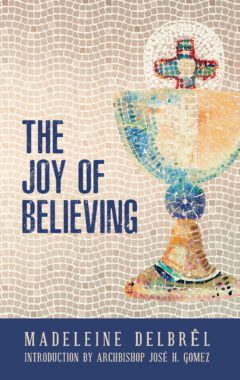To the extent that a Christian professes his faith and tries to live it, he becomes unusual to believers and unbelievers.
This is because the Gospel won’t stop being the good news for Jews and Gentiles until the end of time.
The unusualness of the Christian is purely and simply his resemblance to Jesus Christ, which is put into a person at Baptism and crosses through his heart as if it goes all the way to his skin.
This resemblance entails Christ’s very characteristics—just as two eyes, a nose, and a mouth make up a person’s face, regardless of this person’s age, mentality, or color.
This resemblance has to do with Christ’s characteristics. It includes those who are intelligent and foolish, who suffer a little and a lot, and who are great and little, according to the world.
Being unusual does not mean being a remarkable person, which somehow entitles one to be a “Christian.” It’s the refusal or denunciation in one’s own life of everything that can sever one’s resemblance to Jesus Christ. It’s not the shining achievement of a Christian that makes him unusual. It’s the fact that Christ—who is always the same—shows His face through the face of a human being.
He not only believes in God; he must love Him as a son loves a loving and all-powerful Father, as Christ loved Him.
He’s not only dependent upon God; he is supremely free through God’s will.
He not only loves his neighbor as himself; he must love the neighbor “as Christ loved us”—in Christ’s own way.
He’s not only a brother; he is a good brother—in words and deeds. There are no limits or dispensations from this goodness.
He’s not only a brother to his next-door neighbor; he is a brother to his neighbor on the other side of the earth.
He’s not only a legal brother; he is a practical brother who is straight to the point. He’s not condescending or distant. He’s everyone’s neighbor and neither lowers himself nor becomes haughty and aloof. He’s on the same level. He has no privileges or rights and is superior to no one.
Not only does he give, he also shares. He lends something without expecting it to be returned. He’s available not only to do what is asked of him, but more than what is asked of him.
He’s not only without lies but without silences and “added explanations.”
He’s not only a brother to those who love him, but also to his enemies. He not only tolerates being struck; he doesn’t flee from the one who strikes him.
Not only does he refuse to return evil for evil, he forgives and forgets the evil. Not only does he forget the evil, he returns it with goodness.
He not only suffers and is put to death by some; he dies while suffering for them—not only once, but every time.
He not only judges justly; he doesn’t judge anyone.
He not only shares what he has or what’s in him; he gives the only thing that God has given him as his own—his own life.
He not only fights against the evil within himself; he fights the evil outside of himself. He not only fights against evil wherever it is, but against its fruits—misfortune, suffering, and death. But he fights with goodness and without sinning. If it’s a question of the happiness of many people, he doesn’t accept paying for it via the misfortune of one person.
He not only combats evil in the world; he accepts the suffering he must undergo.
He not only accepts suffering; he accepts it willingly and deliberately, because in it resides the Christian struggle’s energy, effectiveness, and weapon.
He not only struggles; he struggles without glory so that God Himself would be glorified, in order that His name be sanctified and His reign expedited.
He agrees not to look like a hero and not to be one. He accepts not only not being admired; he rejoices in being ignored—not only that others won’t esteem him, but even that he won’t esteem himself.
He not only puts all his energy into his task, but he doesn’t ask what his task is for. He not only doesn’t know who started it; he ignores the work of God in which it’s used.
He not only struggles, but is peaceful, because the omnipotent and loving God who started it is always the one who powerfully and lovingly finishes it. With unwavering confidence, he expects God to provide him with what he works for with all his strength, that his strength alone could never achieve. He asks God that His will be done. He expects God’s Kingdom to come from Him. He knows that prayer is the energy of action.
He not only loves life because God created it; he is happy to experience a life that’s eternal for everyone.
He’s not only happy to live, but is happy to die, because dying is being born to eternal life, and everyone will be judged by God’s love and God’s loving justice. He’s happy to live, not only because creation is God’s daughter, but because her beauty is indestructible even when it’s botched. He’s happy to live, not only because man is overwhelmed by God’s goodness, but because God allows evil only to bring forth a better good.
He not only acts in time, but waits for the fruits of eternity, whose seed he sows in time. This is what he calls hope.
He’s not only happy because he lives, thanks to God, but because he’ll help his brothers and sisters to live with God forever.
+
This article on The Christian, an Unusual Person is adapted from the book The Joy of Believing by Madeleine Delbrel which is available from Sophia Institute Press.
Art for this post on a reflection from “The Joy of Believing” by Madeleine Delbrel: cover used with permission; Photo by James on Unsplash





